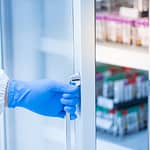In precision medicine, the integrity of biological samples is paramount. These specimens—ranging from blood and tissue to DNA and proteins—serve as the foundation for developing therapies tailored to individual genetic profiles. Implementing robust and reliable sample storage systems is not merely a logistical concern but a critical component in ensuring the efficacy, safety, and sustainability of personalized medical treatments.
Preserving Sample Integrity
Controlling factors such as temperature control, humidity regulation, and protection from contamination is vital. Deviations can lead to sample degradation, compromising research outcomes and therapeutic reliability. For instance, samples stored at ultra-low temperatures can potentially be archived for decades, preserving high-quality DNA, RNA, and even protein enzyme activity1.
Ensuring Data Accuracy and Reproducibility
The reproducibility of research findings is central to scientific progress. Compromised samples can lead to erroneous data, hindering the development of effective precision medicines. By implementing stringent storage protocols, researchers can ensure that samples remain unaltered over time, facilitating consistent results2.
Ensuring Data Accuracy and Reproducibility
The reproducibility of research findings is central to scientific progress. Compromised samples can lead to erroneous data, hindering the development of effective precision medicines. By implementing stringent storage protocols, researchers can ensure that samples remain unaltered over time, facilitating consistent and accurate results.
Regulatory Compliance and Risk Mitigation
Adherence to regulatory standards is non-negotiable in the development of medical therapies. Adequate sample storage supports compliance with guidelines set by agencies such as the FDA and CAP. Failure to meet these standards can result in severe penalties and jeopardize the approval of new treatments. A robust storage system ensures that all samples are accounted for, traceable, and maintained under specified conditions, thereby mitigating risks associated with regulatory breaches.
Enhancing Operational Efficiency
Efficient sample storage systems streamline laboratory workflows. Organized storage solutions reduce the time spent locating samples, minimize errors, and optimize resource utilization. This efficiency accelerates the research and development process, enabling faster delivery of precision medicines to patients in need. Developing an effective and accurate approach to sample storage and management is vital to ensuring samples remain protected and traceable throughout their journey—reducing sample loss, minimizing risk of degradation, and saving time3.
Environmental Considerations in Sample Storage
The environmental footprint of personalized medicine is a growing concern. Energy-inefficient storage contributes to increased carbon emissions. Under-maintained and under-utilized equipment also increases the need for production of new storage equipment, which involves resource extraction and manufacturing processes that impact the environment. Outsourcing storage to companies like Astoriom, who optimize storage and energy use, maintain their storage equipment well and consider the full lifecycle of storage equipment, is a great way to lower the environmental impact of your R&D.
Tailored Storage Solutions
Recognizing the unique requirements of different samples, companies like Astoriom offer customized storage solutions. These services cater to specific needs, considering factors such as sample volume, temperature, humidity requirements, and regulatory compliance. By providing tailored storage designs, Astoriom ensures the safe and compliant preservation of valuable biological materials, supporting the advancement of precision medicine.
In conclusion, the sustainable development of precision medicines is inextricably linked to the excellence and reliability of sample storage systems. By prioritizing sample integrity, data accuracy, regulatory compliance, operational efficiency, and environmental responsibility, the personalized medicine sector can continue to innovate while upholding the highest standards of quality and sustainability.
Learn how we can manage your biological samples: download our biorepository brochure
References:
- Valenti A, Falcone I, Valenti F, Ricciardi E, Di Martino S, Maccallini MT, Cerro M, Desiderio F, Miseo L, Russillo M, Guerrisi A. Biobanks as an Indispensable Tool in the “Era” of Precision Medicine: Key Role in the Management of Complex Diseases, Such as Melanoma. J Pers Med. 2024 Jul 6;14(7):731. doi: 10.3390/jpm14070731. PMID: 39063985; PMCID: PMC11278009.
- Heimo Müller, Georges Dagher, Martina Loibner, Cornelia Stumptner, Penelope Kungl, Kurt Zatloukal,Biobanks for life sciences and personalized medicine: importance of standardization, biosafety, biosecurity, and data management, Current Opinion in Biotechnology, Volume 65, 2020, Pages 45-51, ISSN 0958-1669, https://doi.org/10.1016/j.copbio.2019.12.004.
- Kent-Webb H. Best Practices for Biological Sample Storage and Management. Biocompare. 2022 Oct 6. Available from: https://www.biocompare.com/Editorial-Articles/589906-Best-Practices-for-Biological-Sample-Storage-and-Management/.
About Astoriom
At Astoriom, we are the global quality expert in safeguarding R&D sample assets.
For over 30 years, our customers have trusted us to secure, protect and preserve their scientific and consumer R&D product samples. We offer a comprehensive portfolio of sample stability storage, biorepository storage, disaster protection & recovery, and sample storage equipment & validation services. Our global environmentally controlled storage solutions enable our customers to safeguard the integrity and viability of their valuable sample assets to advance their research innovation. As a global leader and trusted expert in sample stability and biorepository storage solutions, our team of specialists and engineers offer international regulatory compliant quality processes and custom designed sample storage protocols to the top R&D industries worldwide.




